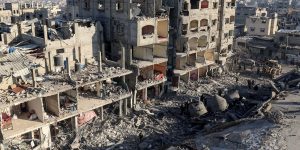I chose this topic because of my interest in the intersection of urban development, conflict, and human rights. Gaza's infrastructure crisis exemplifies the devastating consequences of modern urban warfare, where civilian systems are weaponized to create long-term socio-political instability.
I was particularly struck by how urbicide operates not only as immediate destruction but also as a strategy of prolonged psychological, social, and economic harm. This research expanded my understanding of urban infrastructure as a critical site of both conflict and resistance.
Research Process
My research involved:
- Data Collection: Reviewing reports from NGOs, human rights organizations, and UN agencies on the state of Gaza’s infrastructure.
- Theoretical Framework: Applying concepts from urban studies and human rights law to contextualize urbicide as a systematic and deliberate tactic of urban warfare.
- Source Credibility: Prioritizing peer-reviewed studies and reports from on-the-ground organizations to ensure accuracy and depth.

Through this project, I gained a deeper understanding of how urban infrastructure is not merely a neutral backdrop to daily life but a critical site of power, conflict, and control. The concept of urbicide revealed how the deliberate destruction of civilian systems, such as water, housing, and electricity, serves as a tactic of war with long-term human and social consequences. I also developed a nuanced perspective on how urban warfare exacerbates inequalities and undermines human rights in protracted conflicts like that in Gaza.